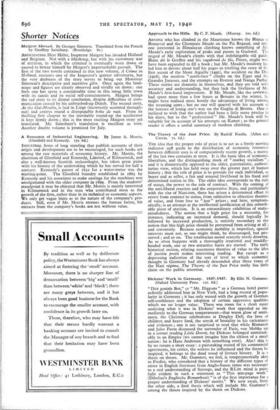THE idea that the proper role of price is to
act as a freely moving indicator and guide to the distribution of economic resources between different uses is of comparatively recent growth, a matter of the last two centuries at most. It is the basic idea of economic liberalism, and the distinguishing mark of "market socialism " ; and it is diametrically opposed to the older, paternalistic, authori- tarian view, which has held sway over the greater part of human history ; that the role of price is to provide for each individual, as buyer and as seller, a fair and assured livelihood in his fixed and determined station in life. The older idea corresponds to the rule of status, the newer to the rule of contract. With the coming of the anti-liberal reaction and the corporative State, and particularly with the rise of Nazi-ism, there has arisen a determined effort to revert from contract to status, from subjective to objective theories of value, and from free to " just " prices ; and here, symptom- atically, is an attempt at the intellectual justification of this remark- able piece of atavism. It is an extraordinary exhibition of static- mindedness. The notion that a high price for a necessity, for instance, indicating an increased demand, should logically be followed by increased production, is entirely secondary to the notion that this high price should be prevented from arising at all ; and conversely. Because economic mobility is imperfect, special interests must not, as one might think, be discouraged, but pre- served ; and so on. The totalitarian moral scarcely needs drawing. As so often happens with a thoroughly irrational and muddle- headed work, one or two attractive hares are started. The early historical section, relating successive theories of value to the idea of justitia pretii makes interesting reading. But except as a depressing indication of the sort of level to which economic thought in Germany had already descended after three years of the Nazi regime, The Theory of the lust Price really has little claim on the public attention.


































 Previous page
Previous page